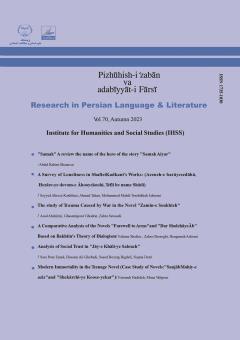The study of Trauma Caused by War in the Novel "Zamin-e Soukhteh"
Subject Areas : Literary Criticism and Theory
Asad Abshirini
1
![]() ,
Ghodrat Ghasemipour
2
,
Ghodrat Ghasemipour
2
![]() ,
Zahra Sawaedi
3
*
,
Zahra Sawaedi
3
*
![]()
1 - Assistant Professor of Persian Language and Literature, Shahid Chamran University, Ahvaz.
2 - Associate Professor of Persian Language and Literature, Shahid Chamran University of Ahvaz.
3 - PhD Student of Persian Language and Literature, Shahid Chamran University, Ahvaz, Iran.
Keywords: Trauma, War, Characterization, Ahmad Mahmoud, Zamin-e Soukte.,
Abstract :
Trauma is a theory in psychology referring to any psychological pressure which the human mind is unable to accept and analyze it. The wounds inflicted on a person's mind would leave a deep impact on him and may lead his life and destiny to a different direction. There are different factors can cause trauma. One of them is war events which has an enduring effect on human's psyche. Therefore, due to the numerous wars that have plagued our country throughout the history, especially the eight-year imposed war, the literary narrative of trauma has found its way into the works of some Iranian writers.The present research was conducted in an analytical-descriptive way and it aims to investigate the literary expressions of this psychological damage in the novel "Zamin Soukhteh" by Ahmad Mahmoud and analyze the damage caused to the psyche of each of the characters. In this regard, first, we have discussed the theoretical issues about trauma, then we have analyzed and examined its effect on the characters of the mentioned novel. At the end, it was concluded that the reaction of each character is different from the other; In this way, due to the psychological wounds inflicted on them, the "Shahed" character is hospitalized in a mental asylum; "Nene Baran" distances herself from his previous personality; "Narges" falls into acute depression and "Golabetoon" completely loses his emotions. Obviously, in addition to the important fictional works in praise of the heroes who appeared in the holy defense, this novel can also be worth studying from the perspective of theoretical framework.
آقاخانی بیژنی، محمود (1396) «جلوههای ترس و اضطراب در رمان زمین سوخته»، نقد ادبی، سال دهم، شماره 37، صص 7-28.
آقایی، احمد (1383) بیداردلان در آینه، تهران، به¬نگار.
اسدی، مهدی (1395) «شخصیّت و شخصیّتپردازی در رمان «الطریق» نجیب محفوظ»، یازدهمین گردهمایی بینالمللی انجمن ترویج زبان و ادبیّات فارسی (دانشگاه گیلان)، صص 723-739.
انجمن روانپزشکی آمریکا (1393) ترجمه یحیی سیدمحمدی، چاپ سوم، تهران، روان.
براهنی، رضا (1368) قصهنویسی، چاپ چهارم، تهران، البرز.
بیهقی، محمّدبن¬حسین (1383) تاریخ بیهقی، تصحیح علیاکبر فیّاض، چاپ چهارم، مشهد، دانشگاه فردوسی مشهد.
ترکمانی باراندورزی، وجیهه و پوران کبیری (1391) «بررسی شخصیّت زنان در پنج رمان احمد محمود»، بهارستان سخن (فصلنامه علمی- پژوهشی ادبیّات فارسی)، سال هشتم، شماره 19، صص 1-26.
حیدریزاده، نگین و دیگران (1394) «زن در ادبیّات از روانزخم (روانزخم) به خودشناسی رسیدن»، فصلنامه علمی پژوهشی زن و فرهنگ، سال ششم، شماره 24، صص 67-79.
داد، سیما (1378) فرهنگ اصطلاحات ادبی، تهران، مروارید.
سعیدی، مهدی (1395) ادبیّات داستانی جنگ در ایران، تهران، پژوهشگاه علوم انسانی و مطالعات اجتماعی جهاد دانشگاهی.
شریفی، محمّد (1386) فرهنگ ادبیّات فارسی، تهران، معین.
شفیعیکدکنی، محمّدرضا (1391) رستاخیز کلمات، چاپ سوم، تهران، سخن.
شمیسا، سیروس (1387) انواع ادبی، چاپ سوم، تهران، میترا.
طایفی، شیرزاد و آذر صوابی اصفهانی (1401) «بازنمایی ترومای ناشی از جنگ و پیآمدهای آن در رمان دیوار»، ادبیّات پارسی معاصر، سال دوازدهم، شماره 2، صص 165-188.
عابدی، داریوش (1375) پلی به سوی داستان¬نویسی، تهران، مدرسه.
فروید، زیگموند (1382) «ورای اصل لذّت»، ترجمه یوسف اباذری، ارغنون بهار، شماره 21، صص 25-81.
قلاوندی، زیبا و دیگران (1397) «بررسی عناصر داستان «زمین سوخته» اثر احمد محمود»، قند پارسی، سال اول، شماره 1، صص 84-101.
قهاری، شهربانو (1401) اختلال استرس پس از سانحه، تهران، رشد.
کاپلان، هرولد و بنیامین سادوک (1369) نوروزها و اختلالات شخصیّت، ترجمه نصرت¬الله پورافکاری، تبریز، رسالت.
گلستان، لیلی (1374) حکایت حال، تهران، کتاب مهناز.
محمود، احمد (1378) زمین سوخته، چاپ سوم، تهران، معین.
موسوینیا، سیّدرحیم و مهسا دهاقانی (1395) «روانزخم و بازنمایی آن در داستان «قورباغه عظیم توکیو را نجات میدهد»»، فصلنامه انجمن ایرانی مطالعات فرهنگی و ارتباطات، سال دوازدهم، شماره 44، صص 199-219.
مولّلی، کرامت (1396) مبانی روانکاوی فروید- لکان، چاپ یازدهم، تهران، نشرنی.
میرصادقی، جمال و میمنت میرصادقی (1377) واژهنامه هنر داستاننویسی، تهران، مهناز.
هومر، شون (1394) ژاک لاکان، ترجمه محمّدعلی جعفری و سید محمّدابراهیم طاهایی، چاپ چهارم، تهران، ققنوس.
Aldoory, H, Awfa (2019) “Verbalizing the Wounds, A Study of War Trauma in Selected Narratives.” Ph.D. Thesis, Tikrit University, University of Jordan.
Alexander, J (2004) "Toward a Theory of Cultural Trauma", in J. Alexander, R. Eyerman, B. Giesen, N. Smelser and P. Sztompka (eds) Cultural Trauma and Collective Identity, Berkeley, CA, University of California Press, 1-30.
-------------- (2012) Trauma A Social Theory. Cambridge, MA, Polity Press.
American Psychiatric Association (2014) Translated by Yahya Seyyed Mohammadi, Ch 3, Tehran, Nashr Ravan [In Persian].
BenEzer, G (1999) "Trauma Signals in Life Stories", in K. L. Rogers, S. Leydesdorff and G. Dawson (eds) Trauma and Life Stories, International Perspectives, London, Routledge, 29-44.
Colin, Davis & Hanna Meretoja (2020) The Routledge Companion to Literature and Trauma.
Freud, S (1953-74) The Standard Edition of the Complete Psychological Works of Sigmund Freud, trans. J. Strachey, London, Hogarth Press.
----------- (1957) "Mourning and Melancholia [1915]", in The Standard Edition of the Complete Psychological Works of Sigmund Freud, vol. 14 (1914-1916) J. Strachey and A. Freud (eds) London, The Hogarth Press, 237-260.
Heidarizadeh, Negin (2015) “The Significant Role of Trauma in Literature and Psychoanalysis”. Procedia-Social and Behavioral Sciences 192, 788-795.
Roger Kurtz. J. (2018) “Trauma and Literature” , pp. 349-380. Cambridge University Press. https, //doi.org/10.1017/9781316817155.025[Opens in a new window].
Luckhurst, R (2012) The Trauma Question. London and New York, Routledge. Mijolla, A (Ed) (2005) International Dictionary of Psychoanalysis, USA, Thomson Gale.
Zhukova, E (2016) "From Ontological Security to Cultural Trauma, The Case of Chernobyl in Belarus and Ukraine", Acta Sociologica 59(4), 332-346.

